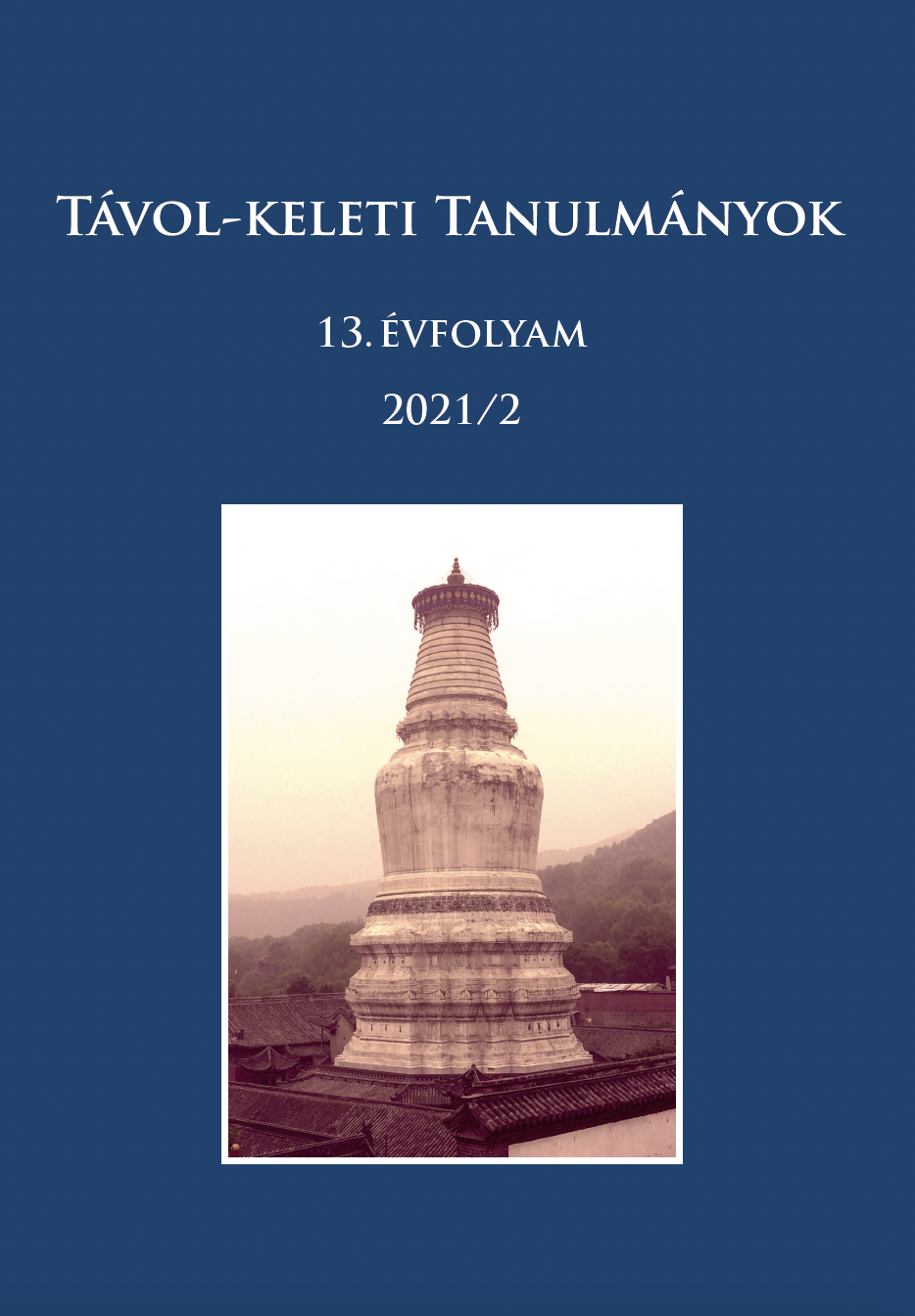Published 2022-09-05
Keywords
- self cultivation,
- Han Feizi,
- ancient Chinese thinking,
- virtues,
- Dao
How to Cite
Copyright (c) 2022 Zsolt Jónás

This work is licensed under a Creative Commons Attribution-NonCommercial 4.0 International License.
Abstract
The study analyzes the Jielao and Yulao chapters of Han Feizi, providing an introduction to Han Feizi’s thoughts about self-cultivation that appear mainly in the two above-mentioned chapters. The analysis is based primarily on the translations of these chapters; in addition, it gives a prospective comparison to other texts of the period relevant to self-cultivation. The study seeks to highlight Han Feizi’s ideas about self-cultivation and how these ideas and the two analyzed chapters relate to the intellectual flow of the period of the Warring States.
References
- Han Feizi jijie 韩非子集解. 1999. In: Zhuzi jicheng 諸子集成, Hangzhou, Zhejiang Guji Chubanshe.
- Bodde, Derk 1967. China's first unifier: a study of the Chʻin dynasty as seen in the life of Li Ssŭ, 280?–208 B.C. Hong Kong, Hong Kong University Press.
- Fung, Yu-Lan 1952. A History of Chinese Philosophy Vol. I The period of philosophers. New Jersey, Princeton University Press.
- Goldin, Paul R. 2012. Dao Companion to the Philosophy of Han Fei. Berlin, Springer. https://doi.org/10.1007/978-94-007-4318-2
- Kósa Gábor 2013. „A konfucianizmus.” In: Kósa Gábor – Várnai András (szerk.) Bölcselők az ókori Kínában. Budapest, Magyar Kína-kutatásért Alapítvány.
- Kósa Gábor 2013. „Laozi és a Daodejing.” In: Kósa Gábor – Várnai András (szerk.) Bölcselők az ókori Kínában. Budapest, Magyar Kína-kutatásért Alapítvány.
- Levi, Jean 1993. „Han Fei tzu 韩非子” In: Leowe, Michael (ed.) Early Chinese Text: A Bibliographical Guide. The Society for the Study of Early China and the Institute of East Asian Studies. Berkeley, University of California.
- Liao, W.K. 1939. The complete works of Han Fei-Tzu: a classic of Chinese political science. London, Probsthain.
- Littlejohn, Ronnie L. 2015. Chinese Philosophy: An Introduction. London, I.B.Tauris. https://doi.org/10.5040/9780755624430
- Lundahl, Bertil 1992. Han Fei Zi: the Man and the Work. Stockholm, Institute of Oriental Languages, Stockholm University.
- Mögling, Wilmar 1994. Die Kunst der Staatsführung: Die Schriften des Meisters Han Fei. Lipcse.
- Needham, Joseph 1956. Science and Civilisation in China Volume 2 History of Scientific Thought. Cambridge, Cambridge University Press.
- Nivision, David Shepherd 1999. „The Classical Philosophical writings.” In: Loewe, Michael – Shaughnessy, Edward L. (eds.) The Cambridge History of Ancient China: From the Origins of Civilization to 221 BC. Cambridge, Cambridge University Press. https://doi.org/10.1017/CHOL9780521470308.013
- P. Szabó Sándor – Tokaji Zsolt 2018. „Előszó – A kínai hadtudomány klasszikusai.” In: Tokaji Zsolt – P. Szabó Sándor (szerk.) A kínai hadtudomány klasszikusai. Budapest, Dialóg Campus Kiadó, 9–22.
- P. Szabó Sándor 2000. „Tudomány és természetfilozófia az ókori Kínában.” In: Ropolyi László – Szegedi Péter (szerk.) A tudományos gondolkodás története. Budapest, ELTE Eötvös Kiadó.
- P. Szabó Sándor 2003a. A kínai erkölcs és a szülők tisztelete. Budapest, Kossuth Kiadó.
- P. Szabó Sándor 2003b. „The Term Shenming – Its Meaning in the Ancient Chinese Thought and in a Recently Discovered Manuscript.” In: Acta Orientalia Academiae Scientiarum Hungaricae 56 (2-4). Budapest, Akadémiai kiadó 251–274. https://doi.org/10.1556/AOrient.56.2003.2-4.12
- P. Szabó Sándor 2003c. „Újonnan felfedezett ókori kínai szövegleletek.” In: Hamar Imre – Salát Gergely (szerk.) Kínai nyelv és irodalom – Tanulmányok Csongor Barnabás 80. születésnapjára. Budapest, Balassi Kiadó, 192–204.
- P. Szabó Sándor 2004. „Yin yu yang shi ruhe shengchende? – Yitiao genju Taiyi sheng shui chongjiande Zhongguo gudai ziran zhexue lilun.” 阴 与 阳 是 如 何 生 成 的? ── 一 条 根 据 《 太 一 生 水 》 重 建 的 中 国 古 代 自 然 哲 学. 理 论. In: Allan, Sarah –Wen Xing (eds.) Xinchu jianbo yanjiu. Beijing, Wenwu Chubanshe, 257–270.
- P. Szabó Sándor 2006. „Xunzi’s Theories on Human Nature in the Light of a Recently Discovered Manuscript.” In: Wen Xing (ed.) Rethinking Confucianism. San Antonio, Trinity University, 127–131.
- P. Szabó Sándor 2007. A yin és a yang fogalma az ókori kínai természetfilozófiában és gondolkodásban – A Hadakozó fejedelemségek időszakának (i. e. 481 – i. e. 221) második fele. (Doktori disszertáció.) Budapest, Eötvös Loránd Tudományegyetem.
- P. Szabó Sándor 2016. „Az önfejlesztés filozófiája – A belső művelése című ókori kínai értekezés.” In: Műhely – Kulturális folyóirat, XXXIX. évfolyam, 5–6. szám, 119–126.
- Peerenboom, R. P. 1995. Law and Morality in Ancient China: The Silk Manuscripts of Huang-Lao. Albany, Suny Press.
- Pines, Yuri 2009. Envisioning Eternal Empire: Chinese Political Thought of the Warring States Period. Honolulu, University of Hawaii Press. https://doi.org/10.21313/hawaii/9780824832759.001.0001
- Puett, Michael J. 2002. To Become a God: Cosmology, Sacrifice, and Self-divinization in Early China. Cambridge, Harvard University Asia Center. https://doi.org/10.1086/491341
- Salát Gergely 2003. Büntetőjog az ókori Kínában. Qin állam törvényei a shuihudi leletek alapján. Budapest, [Sinológiai műhely 3.] Balassi Kiadó, 19–20.
- Salát Gergely 2013. „A teljhatalom ideológiája: a legizmus.” In: Kósa Gábor – Várnai András (szerk.) Bölcselők az ókori Kínában. Budapest, Magyar Kína-kutatásért Alapítvány.
- Sato, Masayuki 2003. The Confucian Quest for Order: The Origin and Formation of the Political Thought of Xun Zi. Boston, BRILL. https://doi.org/10.1163/9789004420328
- Sato, Masayuki 2012. „Studies of Han Feizi in China, Taiwan and Japan.” In: Dao Companion to the Philisophy oh Han. Berlin, Springer Science & Business Media. https://doi.org/10.1007/978-94-007-4318-2_11
- Schwartz, Benjamin Isadore 2009. The World of Thought in Ancient China. Cambridge, Harvard University Press. https://doi.org/10.2307/j.ctv1smjt32
- Tőkei Ferenc 1964. Kínai filozófia – Ókor II. kötet. Budapest, Akadémiai Kiadó.
- Tőkei Ferenc 2005. Kínai filozófia – Ókor II. kötet. Budapest, Magiszter Társadalomtudományi Alapítvány.
- Watson, Burton 2003. Han Feizi: Basic Writings. New York, Columbia University Press.

